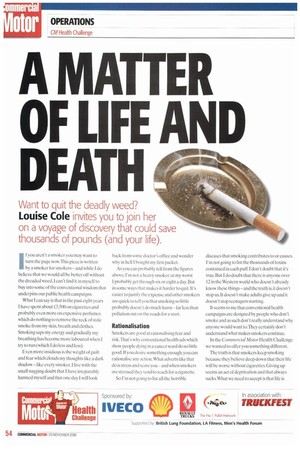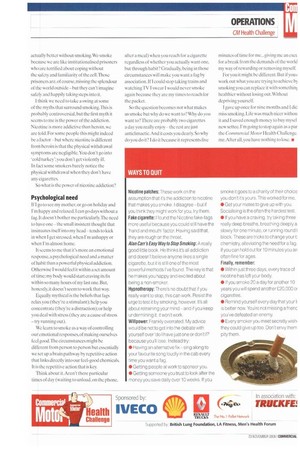A MATTER
Page 54

Page 55

If you've noticed an error in this article please click here to report it so we can fix it.
OF LIFE AND
DEATH
Want to quit the deadly weed?
Louise Cole invites you to join her on a voyage of discovery that could save thousands of pounds (and your life).
If you aren't a smoker you may want to turn the page nowThis piece is written by a smoker for smokers and while I do believe that we would all be better off without the dreaded weed. I can't find it in myself to buy into some of the conventional wisdom that underpins our public health campaigns.
What I can say is that in the past eight years I have spent about 0_500 on cigarettes and probably even more on expensive perfumes which do nothing to remove the reek of stale smoke from my skin, breath and clothes. Smoking saps my energy and gradually my breathing has become more laboured when I try to run (which I do less and less).
Even more insidious is the weight of guilt and fear which clouds my thoughts like a dark shadowlike every smoker. I live with the small nagging doubt that I have irreparably harmed myself and that one day twill look back from some doctor's office and wonder why in hell I bought my first packet.
As you can probably tell from the figures above, I'm not a heavy smoker: at my worst I probably get through six or eight a day. But in some ways that makes it harder to quit. It's easier to justify the expense and other smokers are quick to tell you that smoking so little probably doesn't do much harm far less than pollution out on ike roads for a start.
Rationalisation Smokers are good at rationalising fear and riskrIbat's why conventional health ads which show people dying in a cancer ward do so little good. If you desire something enough. you can rationalise any action. What adverts like that do is stress and scare youand when smokers are stressed they tend to reach for a cigarette.
So I'm not going to list all the horrible diseases that smoking contributes to or causes. I'm not going to list the thousands of toxins contained in each puff. I don't doubt that it's true. But I do doubt that there is anyone over 12 in the Western world who doesn't already know these things -and the truth is. it doesn't stop us. It doesn't make adults give up and it doesn't stop teenagers starting.
It seems to me that conventional health campaigns are designed by people who don't smoke and as such don't really understand why anyone would want to.They certainly don't understand what makes smokers continue.
In the Commercial Motor Health Challenge we wanted to offer you something different.
The truth is that smokers keep smoking because they believe deep down that their life will be worse without cigarettes. Giving up seems an act of deprivation and that always sucks.What we need to accept is that life is actually better without smoking. We smoke because we are like institutionalised prisoners who arc terrified about coping without the safety and familiarity of the cell .Those prisoners are of course, missing the splendour of the world outside but they can't imagine safely and happily taking steps into it.
I think we need to take a swing at some of the myths that surround smoking,Th is is probably controversial, but the first myth it seems to me is the power of the addiction. Nicotine is more addictive than heroin, we are told. For some people this might indeed be a factor -but where nicotine is different from heroin is that the physical withdrawal symptoms are negligible.You don't go into 'cold turkeY': you don't get violently ill. In fact some smokers barely notice the physical withdrawal when they don't have any cigarettes.
So what is the power of nicotine addiction?
Psychological need
If I go to see my mot her, or go on holiday and I'm happy and relaxed. I can go days without a fag. It doesn't bother me particularly.The need to have one-the small insistent thought that insinuates itself into my head tends to kick in when [get stressed. when I'm unhappy or when I'm almost home.
IL seems to me that it's more an emotional response, a psychological need and a matter of habit than a powerful physical addiction. Otherwise I would feel it within a set amount of time; my body would start craving its fix within so many hours of my last one. But, honestly, it doesn't seem to work that way.
Equally mythical is the beliefs that fags relax you (they're a stimulant); help you concentrate (they're a distraction):or help you deal with stress (they are a cause of stress try running out).
We learn to smoke as a way of COM rolling our emotional responses, of making ourselves feel good. 'The circumstances might be different from person to person but essentially we set up a brain pathway by repetitive action that links directly into our feel-good chemicals Ti is the repetitive action that is key.
Think about it. Aren't there pari icLiluir times of day (waiting to unload, on the phone. after a meal) when you reach for a cigarette regardless of whether you actually want one, but through habit? Gradually, being in those circumstances will make you want a fag by association. If I could stop taking trains and watchingTV I swear I would never smoke again because they are my times to reach for the packet.
So the question becomes not what makes us smoke hut why do we want to'? Why do you want torlhere are probably two cigarettes a day you really enjoy the rest are just anticlimactic. And it costs you dearly. So why do you do it? I do it because it represents five minutes of time for me... giving me an excL for a break from the demands of the world my way of rewarding or removing myself.
For you it might he different. But if you c work out what you are trying to achieve 11) smoking you can replace it with somethinl healthier without losing out.Without depriving yourself.
I gave up once for nine months and I did miss smoking.Life was much nicer withou it and 1 saved enough money to buy mysel new settee.I'm going to stop again as a par the Commercial Motor Health Challenge. me. After all,you have nothing to lose. •




































































































































































































































